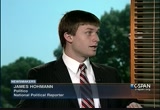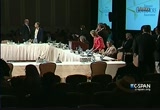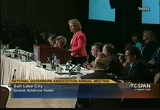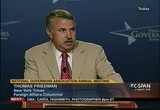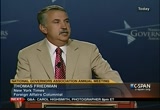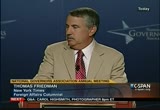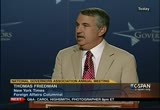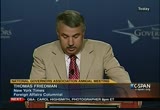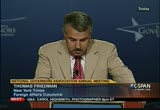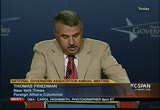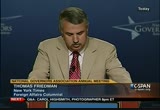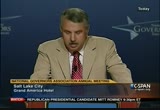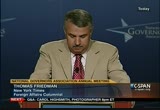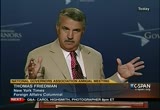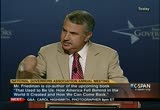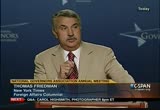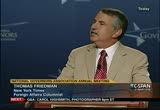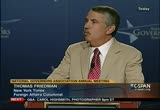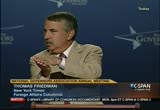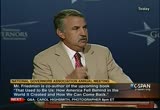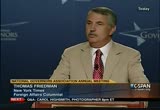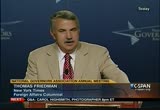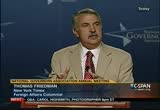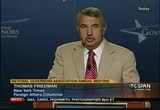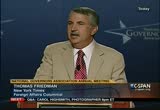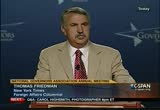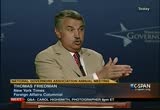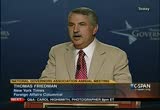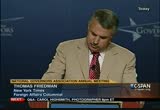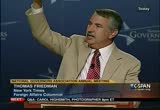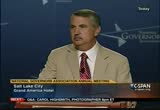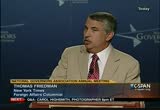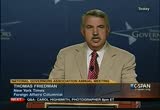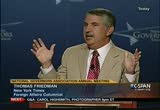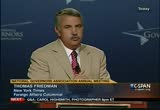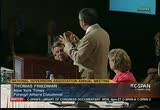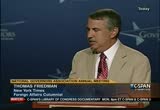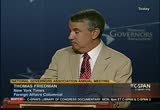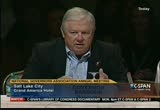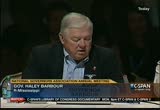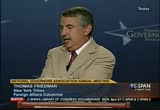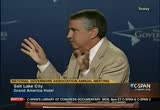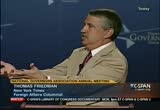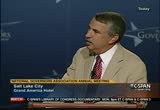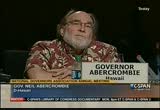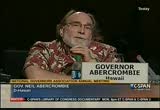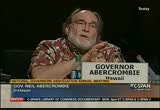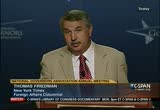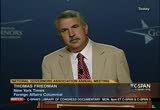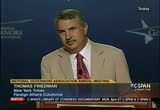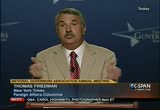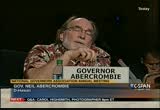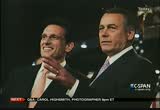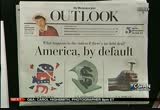tv American Politics CSPAN July 17, 2011 6:30pm-8:00pm EDT
6:30 pm
we are seeing more and more partisan polarizing rancor in states. gregoire downplays what is happening in washington. she has a unified legislature. she faced a lot of criticism for not raising taxes and was passed budget. in minnesota, wisconsin, new jersey, you are seeing more battles just like the disfunction we see in washington. host: this goes to the larger picture of job creation. >> absolutely, this will not be the last time this year we hear about job creation. every former republican governor who would like to be in the race in 2012 was talking about job creation. it is interesting to see what the records are and how much you can do as a governor. governor gregoire dr. of infrastructure but those and other things that happen overnight. those are things you may start during your term of the impact does not come until five or 10 years down the road and you don't get credit for that.
6:31 pm
>> when gregoire took office after 2006, she came in during a huge swell of revenues from natural economic cycles. choose able to increase spending by $5 billion. many governors are now coming in in a bad economic climate and did not get to spend money when times are good and they're forced to make tough sacrifices. host: james holman and sarah murray pat been our guest on "newsmakers." >> i am very interested in what i call disappearing america. america that may not be here 25 years from now. >> for 30 years, carol heiss myth has traveled the united states -- carol highsmith has
6:32 pm
documented the united states. >> this week, british prime minister david cameron takes questions on the phone hacking scandal and the rest of his communications chief. other topics include the public inquiry into police corruption and go hiking, and rupert garcia with british sky broadcasting. prime minister's question, tonight at 9:00 p.m. eastern on c-span. governors' association wraps up today when thomas friedman talks with the governors about advancing competitiveness. this is about an hour and 20 minutes.
6:33 pm
>> what everybody please take their seats. >> that afternoon, everyone. did you all have a great time last night at the olympic park? [applause] for those of us who could go to the americas choir this morning, that was patriotic, just wonderful. thank you very much. welcome to the closing plenary of the 2011 national governors association annual meeting. at this session, we are going to be really very much educated, if you will, about the globe and what is going on and what it means for the united states.
6:34 pm
our a mating -- amazing writer from the new york times, tom freeman is going to talk about advancing america's competitiveness. there is no question that we have challenges. our u.s. teenagers frank 20 bitmap across the will world, 14th and reading. this movement is not confined to our k-12 education. the u.s. has fallen from first to 12th in the number of americans that complete post secondary degrees. for the first time in history, the u.s. is faced with a generation of young adult that is projected to have a lower educational attainment than their parents. it comes as no surprise that only 44% of americans believe is likely that today's youth will have a better life and the parents, the lowest rate since the poll began in 1983.
6:35 pm
we have open the doors to higher education for millions of americans. i think our higher education system is second to none, but too few of our students who began higher education ultimately obtain a degree, and too few of them lead to a good paying job and rear. without war student completing a higher degrees, our ability to out innovate and out produce other nations is in severe jeopardy. we all know that education is the primary driver of economic growth. it is our supply of skilled labor that remain flat and the economic engine that drove us to prominence in the 20th century may once again stalled. so we must redouble our efforts to invest in human capital, the infrastructure of america that has defined america's standing
6:36 pm
in the world for the past 70 years. fortunately, it is my pleasure today to welcome back tom friedman, one of our nation's four most speakers, to talk about global competition and the challenges and opportunities that lie ahead for our united states. he has written for the new york times for 30 years including five best-selling books. he has received numerous awards for his reporting and commentary, including a lifetime achievement award. he has joined us on several occasions in the past to offer his inside an opinion on the hot topics of the day, domestically and internationally. it is with great pleasure that here in the great state of utah we get to turn once again for the insides of our friend tom friedman for his perspective on how america can recapture its position as a global competitor
6:37 pm
and economic leadership in the world. thank you. [applause] >> it is a treat to be back here for the governors' conference and to be back in utah. this is a great audience. one of the things i love about this meeting as i look around and see all these great governors, some of whom i have had the pleasure of knowing, it does not a democrat or republican a under everyone's name. it is in that spirit that i come here. i hope i give both sides a little bit of indigestion and a little bit of support in what i am about to say. i will talk for 30 or 40 minutes and then we'll open it up for dialogue. i am going to give you a sneak preview of my new book.
6:38 pm
it is a book i have written with a different and longtime collaborator from johns hopkins university. the book is not until september, but it is certainly on the topic of the day. the book is called "that used to be us: how america fell behind in the world we invented in how we find our way back." every time michael and i tell people about our book, they ask if it has a happy ending. [laughter] we tell them it does have a happy ending. what we cannot tell you is whether it is fiction or nonfiction. that is going to depend on us. you might wonder why two foreign-policy guys. he teaches and i am a columnist. you may ask why we ended up writing a book about foreign policy. over the last couple of years,
6:39 pm
we started to notice something we would start talking about america in the world and would end up talking about just america. we realized what that was telling us was that america, its fate, future, and vitality, really is the biggest foreign policy issues in the world. we could not think intelligently about american foreign policy unless we were thinking creatively and anew about the sources of our strength and vitality. i will be honest with you. it is our view that the american dream is now in peril. that is so important.
6:40 pm
we have taken the american dream so much for granted that we have forgotten it is the vital source of our domestic stability. it has enabled us to hold this country together, invite in so many immigrants, to unify 50 states. it is the idea of a growing economy where everyone can expect to the better than their parents. the american dream is vital to our status in the world. people forget that we provide the world so much global governance, whether it is maintaining global institutions or protecting the sea lanes of global commerce. i do not mind saying this at all. america is the tent pole that holds of the world. if that fractures, your kids will not just grow up in a different america. they will grow up in a very different world.
6:41 pm
this thing that we call america is a precious jewel. we really need to get back to polishing it. with that introduction, i would like to share with you the first few paragraphs of the book. the first chapter is called "if you see something, say something." that is the homeland security model. we are now applying it to the country as a whole. this is a book about america that begins in china. in september of 2010, i attended the world economic conference in china. it involved a 3.5 our car ride from beijing to a chinese version of detroit. now to get there, you have to go to the beijing south road
6:42 pm
crustacean. it was a modern building covered with solar panels. you buy a ticket from an electronic kiosks offering choices in chinese and english. the board of a high-speed train that goes to another rumi modern train station that is said to be the fastest when it began operating in 2008. the chinese poetry and covers -- the chinese bullet train covers distances fast. the expedition center was a mass of beautifully appointed structure. as if the convention center was not impressive enough, eco dash sponsors give some facts and figures. the co-sponsors gave some facts and figures. the construction of the convention center started in 2009 and was completed in may of 2010.
6:43 pm
i started counting on my fingers -- eight months. returning home to maryland, i was describing the complex and how quickly it was built. ann interrupted me and asked if i had been to the subway stop quickly. we lived in bethesda and often use the washington metro subway to get to work in downtown washington. i had been there and new-issue is talking about. the two short escalator's had been under repair for nearly six months. the one being fixed was closed. the other had to be converted into a two-way staircase. this was creating a mess at rush hour.
6:44 pm
everyone had to squeeze single file one locked escalator. it sometimes took 10 minutes just to get out of the station. the sign on the close escalator's said the repairs were part of the massive modernization project. what was taking this modernization so long? we investigated. a spokesman for the railroad said the repairs were scheduled to take six months and were on schedule. she said mechanics need 10 to 12 weeks to fix each one. the simple comparison may start in point. it to china 32 weeks to build a world-class convention center from the ground up including giant escalators in every corner. it was taking the washington metro cruz 24 weeks to repair two tiny escalators with 21 steps each. researched further and found in local news radio station that interviewed the manager. he said they were behind the curve and had to catch up. last week, smoke began pouring out of the escalators at the
6:45 pm
dupont station during rush-hour. "the washington post" ran a letter to the editor. he said as someone who has ridden metro for 30 years, i can think of a better way to assess the health of the escalators. for decades, they ran efficiently. for the past few years, aging parts have generated terrible noise is the sound like a dinosaur trapped in a tar pit screeching is dying screams. what we found most disturbing came from maryland community news about the long lines at rush hour. my impression standing on line is that people have sort of gotten used to it. benjamin ross of bethesda wrote that people have sort of gotten used to it. it is the sense of resignation and that this is just how things are in america today, the sense that america's best days are behind in china's best days are ahead of it, have become the subject of dinner party and
6:46 pm
caution conversations across america today. do we buy the idea that america owned the 19th and 20th century and china will inevitably on the 21st century. iraq no, we do not buy that. we have written this book -- no, we do not buy that. we have written this book to explain that view. we're not pessimists when it comes to america's future. we are optimists. we're frustrated optimists. that is my mode it today. i am an optimist, but i am frustrated optimist. the title of the first chapter is the mantra of the department: security -- department of homeland security posted in airports and roads stations around the country. we have seen and heard something. millions of americans have as
6:47 pm
well. will we have seen is not a suspicious package under a stairwell. what we have seen is hiding in plain sight. we have seen something that poses a greater threat to our national security and well-being than al qaeda ever will. we have seen a country with enormous potential falling into the worst sort of decline, a slow decline, just slow enough for us not to drop everything and pulled together for collective action to fix what needs to be fixed. this book is our way of saying something about what is wrong, why things of gone wrong, and what we can and must do to make them right. our view is that america faces four great challenges. one is adapting to the i.t. revolution. second is adapting to globalization. the third is all the issues around entitlements and deficits. the fourth is energy and climate. i do not have time to go into
6:48 pm
all of them. i will focus on the first two. adapting to the globalization revolution and the i.t. revolution. it is really one subject because they merge and create what i call a flat world. what i am really talking about is adapting to the flattening of the world. last time i was here was to talk about how the world is flat. i wrote that book in 2004. i thought it was at the cutting edge. if you pick up the first edition of "the world is flat" and look in the index, you will discover that facebook is not in it. facebook basically did not exist. 4g was a parking place.
6:49 pm
applications for something you sent to colleges. let me repeat that if you did not get it. [laughter] when i declared that the world was flat, facebook basically did not exist. twitter was a sound. a cloud was in the sky. for most people, skype was a typo. all of that has happened in just the last six years. the only way i can describe what that has done is that it has taken us into flat world 2.0. the world is not just connected them. it is hyper-connected. i would argue that is the biggest thing going on in the world today. you can see this through a lot
6:50 pm
of different news stories. when i wrote that, i said that we connected boston and bank a lawyer --bangalore. since 2004, we have connecting boston, bangalore, and another city. india is adding 18 million cellphones a month. they are now part of this flat world. i have spent a lot of time following the middle east. we have connected detroit and damascus. now we have connected detroit, damascus, and dara. it is a dusty desert town on the syrian-jordanian border where the revolution began.
6:51 pm
syria has banned every international news organization. bbc, cnn, fox, "new york times," and al jazeera. yet every night, you have been seeing news footage coming out of dra. if you look at the bottom of your screen, it says is from smn. sham news network. sham is arabic for syria. i would bet the governors in their wallets right now have enough money in their wallets to start sham news network. they have been pumping out video and flip camera footage from dara through sham news network. that is half what the world has become. on october 30, 2010, an indian newspaper ran a small item.
6:52 pm
i happened to be there at a time. it caught my eye. it said a communications firm had just started had3g service at the summit of mount everest. it will allow thousands of climbers to access highspeed video and internet calls using their mobile phones. the bbc observed it was a far cry from 1953 when edmund hillary first climbed the summit using runners to carry messages from his expedition to the nearest telegraph office. you can imagine the phone calls being made. "hi, mom. you will never guess where i am calling from." the same month, an item showed up in the business pages. it reported that a small silicon valley company had just opened the world's largest commercial solar research and
6:53 pm
development center, a privately funded, in china. it sought applications for 260 scientists and technologists in china. the company spokesman said the center received a 26,000 chinese applications and hired three and 30 people. 31% headmaster's or ph.d. degrees. roughly 50% of the solar panels were made in china last year. we need to be where the customers are. one last news story. my mother-in-law was formerly chairman of the board of cornell college. here is an item the paper carried about granell college in the middle of iowa. this year, nearly one out of 10 students applied were from china. it is a small college of 1600 students.
6:54 pm
half of the applicants from china had perfect scores of 800 on their sats. what is all of this telling us? it is telling us that the world is flatter than ever. when the world gets this flat, it means the whole global curve is being raised. employers in all states now have that much easier access to software, robotics, and talent anywhere in the world. i know you have heard this joke before. that is what they said about japan in the 1980's. we have heard this joke before. they said japan was going to steamroll us. lo and behold, we steamrolled them. this is a little bit different route. japan threatened two american
6:55 pm
industries in one american town. the town was detroit. the industries were consumer electronics and of those -- autos. globalization challenges every town, american jobs, and industry directly or -- indirectly. this is a different show. you have not heard this one before. what is basically happening is the whole global curve is being raised. i came across this post. i thought it really captured when it meant for the job market and education. this is on his blog. he attached it to a column of mine in the comments. that is where i saw it. he has headed a variety of
6:56 pm
technology companies and start- ups. he also teaches in the courses. -- he also teaches mba courses. he explained it this way. i am in the course of killing jobs. i would kill jobs three ways. i kill jobs when i so, with competitors, and focusing on internal productivity. all the companies i have been ceo of eliminate jobs by automation, outsourcing, and efficiencies. the marketing is clear. i reckon in the last decade i have eliminated over 100,000 jobs in the world wide economy. so there, i said, i am serial job killerany job that can be
6:57 pm
eliminated through cheaper labor is not coming back. the worker can come back. they often come back by being underemployed. often, others return to previous levels of compensation. but the landscape has changed as far as what is a sustainable job. so what is a sustainable job in such hyper connected, hyper flat world? he says the best way i can articulate what is a sustainable job is to tell you that as a job killer the sustainable job is a job i cannot kill. a sustainable job is a job i cannot kill and i cannot kill creative people. there is no productivity solution or outsourcing that i can sell to eliminate a creative person. i cannot kill unique value creator. a unique value creator is unique. they may be someone with their relationship to a client or a great salesman or they might be someone who has spent so much time mastering a market or subject at no one else can match.
6:58 pm
what he is telling you, i think is critical to the employment picture today. i call it a great inflexion. this hyper flattening of the world coincided with our great depression. what that's doing is driving these productivity tools faster than ever. there is no question we need more demands, but don't lose sight of this transition. this is hugely important. what we did, and the thing you have to understand about this trend is that it applies to everybody. it applies to everyone. you're saying easy for you to say, mr. new york times columnist. you will not be all sorts. let me tell you about my life. i inherited james reston's office in the washington bureau
6:59 pm
of "the new york times." those of you or old enough to know him as one of our great columnist as the 1960s and 1970s, what an honor, i inherited his office and i will bet if he were here, we could ask him. i would bet he's to wake up back in the '60s and ask himself on any given morning, i wonder what my seven competitors are going to write today. i wonder what they're going to write? i'd do the same thing. i wake up every morning and say i wonder what my 70 billion competitors are going to write today. i wrote about greece this morning. our stringer in greece e-mail may what people in greece are saying about it. if i cannot tell them something new or fresh about their country, then he needs me? so and none of us is going to be immune to this process.
7:00 pm
what is basically going on to put it in language of labor economist is called skills bias polarization. that means those people who do non-routine worked, computer scientists, physicists, governor, those of us to do non-routine work, this flat world works for us better than ever. those who do routine work in the middle are getting crushed by anything that can be automated, outsourced, or digitized. those who do the low-skilled work like a butcher, baker, the candlestick maker, they will be o.k. but they will be dependent on local circumstances. we are basically blowing a hole faster and bigger than ever in the labour market.
7:01 pm
if you do not have those non- routine skills, you will be under more pressure than ever. but i want to stress that it applies to everybody. i started thinking about this at the height of the recession. i was having dinner of their best friends in washington. i said what's the subprime crisis, what does it mean for a law firm? he says it means we're laying off people. i said that's interesting. who gets laid off first at a law firm? is it last in, first out? he said not anymore. basically, who gets laid off is when we are in the middle of a credible and there's a lot of work, the people that get paid, they hand it to the lawyers and they hand it back, some of them oregon. -- are gone. the people we're keeping our the ones who said we could do the old work in a new way or we can do no work and a new way if we
7:02 pm
take advantage of this new world. what's that about? we have a chapter in the book called "help wanted because you can't actually talk about education and much talk to employers and say what are you guys looking for in an employee today? we took four categories, high- end white collar, low-end white-collar, blue-collar and green collar. the u.s. army. the u.s. army is the biggest employer and one of the biggest educators in the country. and you know what they said? they all gave the same answer -- we are looking for people who have critical reasoning and technical skills in order to give an interview. in order to get an interview.
7:03 pm
because now we want something else. we don't just want people who can do the math and critical reasoning. we want people who can adapt, and vent, and reinvent the job along the way. the global market is moving so fast that if i do not have workers touching the product and cannot adapt and reinvent it faster, i have a real problem. dupont said we want every worker today, starting with a line worker to be present. to be paying attention because that worker may have an insight that can drive enormous productivity or new products. my favorite interview in that chapter was with general martin dempsey. he just became the chairman of the joint chiefs. when we interviewed him, he was head of the army education core and he told a remarkable story.
7:04 pm
he was our commander who took baghdad from saddam hussein in 2003. he later went on to be sent, -- centcomm commander. he later went on to be the centcom commander. he was visiting an outpost in the far reaches of afghanistan. he sat down to interview capt. there. at the end of the interview, he realized that capt. in that isolated outpost in afghanistan, because of this hyper connectivity had access to more intelligence and more firepower than martin dempsey did when he took baghdad from saddam hussein. that has driven his whole education of the army system. at the camp, they give every new recouped and iphone and you
7:05 pm
download the application and teach the class. when you have a commander in the outpost of afghanistan with more power -- more firepower and access to intelligence than you did when he commanded the troops who took baghdad, that commander has to be trained to invent, reinvent, and adapt so much more than anyone can -- anyone 10, 15, 20 years ago. that's happening throughout the labor market. what does it mean for education? >> it means we have to educational challenges today. we need more education in better education. buy more education, and this is a challenge all of the face, we need to bring the bottom up to our average and we need to do it really fast. at the same time, we need to
7:06 pm
bring our average so much higher. to the global average. do not compare your students to the school down the street because they are not competing for that place anymore. not with the school down the street. they are complete -- their competing with the students from shanghai which this year won the top place in the world tests. we need to bring the bottom to the average and we need to bring the average so much higher because average in this hyper connected world is officially over. average is over. woody allen's dictum than 90 percent cited showing up is no longer true. it will not cut it anymore. being average won't cut it anymore.
7:07 pm
america's economic future will depend on how well we are able to get our country to be all women are strong, all the women are good-looking and all the children are above average. average is over in a world where so many machines and available foreign workers can get average or better, the curve everyone is being greeted on is moving up. what is average work will not return average wages let alone above-average wages. if all you ever do is all we've ever done, that's no longer applicable. if all you ever do is all you ever done, all you'll ever get is less than you have ever got given this hyper connection of the world. what that means is everyone has got to find their extra. their own unique value proposition. whatever your extra is, everyone needs to find it and use it to become a creed of
7:08 pm
lawyer, columnists, creative governor, creative service worker. everyone everyday is going to have to justify their value added. for some, it will be invented and a new product or service. for others it will be reinventing yourself to do a routine task in a new or better way. how many of us have elderly parents in a nursing home. you go to the nursing home and there's that one health-care worker who didn't just take care of mom and dad but engaged in a way that really brightened their day? that person found their extra. the first thing we do in see that as go to the manager and say we want that person to work with mom and an ad and we will pay more for that. everyone has some extra to find.
7:09 pm
that is really where education is going to have to go. i hate to say this, but so many americans are being educated not for $40 an hour jobs, but $12 an hour jobs. they may think they're being educated for $40 an hour jobs but they're not. the creative component of education has to be on the rise. we have to become a nation of starter uppers, whether it is starting up yourself, starting in a committee -- a community organization, a new company, started in website, we have got to become a nation of starter uppers' because productivity will be constantly shrinking of the workforce. the days when you could hope that intel would come to your state with a factory of 20,000 people, those days are over. now read 20,000 people starting jobs for five people, 10 people
7:10 pm
and that is what everybody has to be thinking about. how do i make people's lives more comfortable, more educated? more fun, more entertaining? we have to be a nation of starter uppers. the last thing i will say about this -- their right attitude for educators today, all of us, and you are all educators is to teach our kids not just reading, writing and arithmetic, but to get them to think like new immigrants, like artisans, and like a waitress. let me explain. what does it mean to think like an immigrant? it means approaching the world with a view that nothing is owed to you. nothing is or will be given that you have to make it on your own. there is no legacies' lot waiting for you at harvard, the family farm or anywhere else.
7:11 pm
you have to earn or create your place in the world and you have to pay close attention to the world in which your living. all americans now find themselves in new and unfamiliar circumstances in this hyper connected world. we are all new immigrants in this hyper connected world and that's how you have to approach education and the job market, with that same kind of internal drive and fortitude. seconds, this is from the professor and labor economist at harvard who says everyone should think like an artist and. = = -- an artisan. artists and was the term used before mass manufacturing to describe people who made things are provided services with a distinctive touch and flare in which they took personal pride. ive touch and flare in which they took personal pride. whether with a saddle or a pair of shoes or piece of jewelry,
7:12 pm
the shoemaker, artisans give a personal touch to what related. artisans give a personal touch to what related. they often carved their own initials into what they did. it was such a personal touch. that's a good mind set for whatever job you are doing. would you want to put your initials on it? think like an artisan. finally, it would not hurt for all of us to think like a waiter or waitress. in late august of 2010, was back in my hometown of minneapolis having breakfast with my best friend at the pancake house. he ordered three buttermilk pancakes and fruit. i ordered three pancakes and scrambled eggs. when the waitress came back with our breakfast, she put the down in front of each of us, but when she put my friends played down,
7:13 pm
she said i gave you extra fruit. we gave her a 50% tip for that. that waitress does not control much in her work envirment, but she controlled the fruit. it was her little way of doing something extra. in many ways, we all need to think like that waitress and ask what is it about how i'd do my job will differentiate me more than ever? we're all waiters and waitresses trying to do that something extra that a computer or robot or just an average person cannot or will not do. getting everyone to unlock, unleashed, discover, to become creative lawyers, doctors and journalists, that's our educational challenge.
7:14 pm
i like the way the president of florida international university with 42,000 students once put it. he said is imperative would become better at educating students not just to take good jobs, but to create good jobs. that's good advice. in today's world, you will not -- we are lucky. we are all roughly from the same generation. we got to find our job when we got out of college. our kids will increasingly have to create their job when they get out of college. the sooner, faster and more effectively we train them to do that, the better. we are really going into a different world. the world i grew up in was a world of developed and developing country. that is over. in the flat world, there wi be two kinds of countries.
7:15 pm
there is high imagination enabling countries and low imagination enabling countries. that is going to be what really makes a difference. if i've just got the spark of an idea, i can go to tie one and a will do this. jump over to amazon and they will do my fulfillment and delivery and i can get my logo done and find an accountant as well. they are all commodities except this -- having more people in our society doing this in every way in their lives, that is what it's about. we have to be their hyper, high imagination enabling country. that is where the cutting edge of jobs is going to be. let melose with a few concluding point you will noticehat i ha
7:16 pm
tried to do today is talk about america and it challenges by starting where i think the conversation should start -- what world are we living in? to me, it is so sad to listen to the national debate today which is all about i cut you one trillion, raise your trillion. you can go without a plan, but if you cut without a plan, watch out. you may hit an artery. you may sever a bone. we do have to cut. that's a big part -- we a cut, raise revenue and invest. but let's start a conversation with what world we are in. not who can throw the biggest number on the table and the most
7:17 pm
stubborn about saving something were cutting something. it is an idiotic debate we're having and unworthy of our country. this is a whole other theme in the book which we do not have time to talk about. we did not get here by accident. you did not get where you are and i did not get our i.m. on my own. yes there is a lot of people out there is as i got this and i'm going to keep the government out of my life. you got here as a product of the greatest public-private partnership in the history of the world. that's how you got here. and we call this americas at formula for success. it has five parts. we educate our people up to and beyond what ever the level of
7:18 pm
technology is starting with universal primary and then post secondary education. we invite the world immigrants in, those with low skills and those with high skills, the first round intellectual draft choices, and start 30% to 40% of the new country -- new companies every year. build the best infrastructure and we have the best rules, the smallest rules -- the smartest rules, and not too many to incentivize risk-taking and capital formation and to preserve the rule of law and sanctity of markets. lastly, we have government- fund research that pushes up the boundaries so venture capitalists can pick the flowers and start new companies. you look at our history and those five this, education,
7:19 pm
and the structure, the right rules for capital formation and government-funded resources have propelled us going back to hamilton. and about that -- think about lincoln in that civil war, he creates the land grant universities in all of your states and build the national railroad connecting the atlantic with the pacific and passes the homestead act. he starts the national academy of sciences. teddy roosevelt, eisenhower -- these were all great builders of our formula for success. governors, i am sorry to tell you, but look at all five indices of our formu for success today, education, immigration, infstructure, rules for capital formation, how did you like that subprime crisis? government-funded research --
7:20 pm
all five pillars of our formula for success are today eroding and in peril. this is the greatest public- private partnership. this is the real source oour strength. that's what our debate should be about. what do we cut because we've had to cut and we've made promises we cannot keep? where can we raise revenue because we need to reinvest, renewed and refreshed this formula for success for the 21st century. that, to me is what the discussion should be about. let me and my saying this. i began by saying michael and i were optimist, but frustrated. you've heard me now for 30 or 40 minutes and you are entitled to ask -- we get the frustration,
7:21 pm
but where from up the optimism? i will tell you. the short answer is we stand on our heads a lot. if you look at this country upside down, it's easy to be an optimist if you just stand on your head. the country looks so much better and it's so much more exciting when viewed from the bottom up rather than the top down. when you look at the country that way, you see the greatest generation has not died. theica's great strength, thing that makese an optimist, and it is the penultimate chapter of this book, is that, thank god this country is still all of people who just did not get the word, thank god they did not get the word we're supposed to be depressed, and the
7:22 pm
recession or unloved by the rest of the world. college dropouts are supposed to flip hamburgers and people of color are supposed to go to the back of the bus. instead,hey just do it, we are still the most open society in the world where individuals with a spark of idea or the passion to succeed can get up and walked out the door, chase a rambo, lead a crusade or started business. show me an obstacle and will show you an opportunity is still the motto. of all of these americans who just did not get the word. rosa parks just got on the bus and took her seat. so college dropouts just got up and created four of the biggest companies in the world. when all seemed lost in iraq, the u.s. military cho to
7:23 pm
surge because not -- when the officers told me one of my all- time favorite quotes -- we were just too dumb to quit. thank god. this country is still full of people who did not get the word and are too dumb to quit. but we'll them something. if i were to draw a picture of america today, it would be a picture of the last space shuttle taking off. all of that thrust coming from below. that's all of those people down there who did not get the word. our country is still full of that injury -- skillful that energy. the washington d.c. is cracked and the pilots are fighting over the flight plan. as a result, we cannot achieve escape velocity. the escape velocity we need to bring the american dream to the next generation.
7:24 pm
that booster rocket is our 5 part formula for success. we need to cut and we need to raise revenue because we need to reinvest in that the booster rocket for all those people too dumb to quit. that's all part of our past. to repeat the title of my book -- that used to be yes. because that used to be yes, it can be again. that is why today, the history books we need to read are our own. the country we need to rediscover today is america. thank you very much. [applause] thank you. thank you. [applause]
7:25 pm
>> thank you very much. that was inspiring and -- we've got time for a dialogue now. i turned to my fellow governors. you and i had a brief conversation before we began. you just flew in from greece. we talked yesterday about the applications of what is happening to the u.s. economy and -- would you mind sharing your insight about your view on what is happening and that the impact on america? >> i was in greece for a few days last week. greece is a cautiary tale of many things. the thing to realize about greece is in many ways, it's just a petro state.
7:26 pm
its oil was in brussels. its oil came from the european union. since 1981, since greece has been in the european union, it has been getting subsidies for infrastructure and education to bring it up to the level of the southern journey -- southern germany. they squandered and misent those resources. is really just an oil state. we have to be careful that we are not an oil state. we can print dollars and we are the reserve currency. greece realized that what has happened in the last six years as we have gone from connected to interconnected to interdependent. it has happened really fast. greece woke up and said there
7:27 pm
were not just connected to germany but they have to be germans. you have to pay taxes, work and german hours, take a german vacations. forget this mediterranean gig. you are germans. right now, you are seeing a great rebellion because it is a lot easier to borrow money for 30 days than become german. i did not know how the story will land, but it is really about values. that is what happens. we become interconnected, interdependent. all around this table, we are indirectly affected by whether or not the greeks will become germans. if the greeks defaults and it brings down german and french banks, remember those things called collateralized debt obligations, better known as
7:28 pm
derivatives that all of the people were betting on about your house, your house, and your house? those same people have been betting on those banks. we have no idea if those banks ago under what bilons illions of dollars of derivatives wille triggered and what banks or hedge funds in america are vulnerable. we are all sitting here a long way away from greece, but whether they become germans really will touch us. it is a values issue. we've gone from the values of the greatest generation which i would call sustainable values, values that sustain, something that i learned from my friend. we have gone from sustainable values to situational values. do what the situation allows.
7:29 pm
you only make $50,000, tried to buy an 800 thicket thousand dollars home -- an $850,000 home? if the situation allows me, then i will do it. we have had a shift in this country. we need to get back to sustainable values, not sustainable values. that is our challenge. it is the same challenge for the greek people, but much more immediate. >> you talk a lot about education, better education, raise the average. we all do this with of these k- 12 systems with a the same hours, sambooks we have had for 100 years. how do we make them more efficient? >> i know yourestle with this a lot. i am married to a first grade
7:30 pm
teacher. my daughter did it teach for america, so we talk about this a lot. i will jus read the first paragraph because this is right on your point, governor. the chapter's called "home work x 2 = the american dream." "hillary clinton never asked us fo career device. had she done so, we would have told her this. when president barack obama offered her the job of secretary of state, you should have said no thank you, sir. it would have been wonderful to have been secretary of state when they spend all his or her time talking to a negotiating with other governments.
7:31 pm
now the success depends on how much leverage the secretary it brings it to the table. it depends on american economic vigor. today, more than ever, national security depends on the quality of education. that is why i do not want to be secretary of state come inste want to be at the heart of national security policy, i want to be secretary of education." what all these problems have in common, which is an underlying theme of the book, is that we talk about our education. they only have a collective solution. unless we act collectively, we cannot address the problems our country faces. that is why we are stymied. there will be no democratic or
7:32 pm
republican solution. there will only be a high rent collection solution. i have been around educators to much to t humbled by how difficult buses, so i cannot tell you if we need bigger classrooms, smaller clusters, more teacher's assistants, or what. here's what we argue in the chapter. we all need to be part of the solution and make two points. the first is this. you give me a community with a the rht neighbors who are ready to invest in public schools even if their kids are not in them because they know of they do not, they could be investing in bigger business. you give me parents who asked their kids every day to take an interest in their education and set higher standards for them. do you give me politicians who are out in the world learning what are the highest, best practices and coming home not trying to lower their state
7:33 pm
standards but raised them, not tryi to lower the basket but raised them. give me students to come to school ready to learn, not to send 40,000 text messages, and i will give you better teachers. i will make the worst teachers better and everyone of my better teachers better. i saw one of the worst movies i saw this year, "race to know where, -- "race to nowhere." it is about how our kids are so stressed out going to facebook, theater practice. you doot know what stressed is. stress is not understanding the thick chinese accent of your child's first boss. that is stressed. not enough facebook time does not qualify as a "ress"in my world. we profiled a teacher reform
7:34 pm
program which we think has been one of the cutting edge systems. there is way too much dated today that makes it clear that the greatest leverage change that because firm can have is a high the effective teacher a highly efftive teacher can take a student three years behind and catch them up in a bad teacher can take a teacher on grade level and put them three years behind. the question is how do we partner, and this hato be a partnership, with teachers and the teacher unions have to do their part, governors have to do their part, to put in place evaluation system so that we are able to weed out the ineffective teachers or retrain those that can be retrained. should we award are teachers on the basis of their real
7:35 pm
standard that teachers deal is fair. i know a lot of your states have been examining this. i have been impressed with what colorado has been able to do. they were able to get the american federation of teachers to go along th it. when you find a way to get teachers to buy in to an evaluation system and they did in washington, d.c., and the ratings of teachers found they fired 206 teachers that for two years in a row were not rated effective. that is something they are doing in partnership with the union. it is a combination of working with teachers to find ways to evaluate. when you are married to a teacher, you know one thing. the biggest education
7:36 pm
philanthropist in ameca are teachers. there's nobody who has given more money out of their pocket, more hours of their time for pre than a teacher. if you are married to one, you know that. i am very uncomfortable when they say it is the teachers. we are trying to do to our teachers what we did in the soldiers out of iraq. 1% are going to carry the burden and the rest of us, we will just go along well with our lives. yes, teachers are critical and they are the key leverage agent, but we all have to be in on this game. parents, neighbors, business, politicians, and kids themsels need to be aware of the world they're going into. >> a governor barbour? >> pleasure to have you back.
7:37 pm
as a republican governor, i may be surprised to say i agree with a "the new york times" columnist." >> can we get a close-up and freeze frame on that? >> when using values are the biggest thing, sustainable values. the first two subjects you spoke about in the q&a have brought this to my mind. one is we spend more on education and the state, federal, and local than any other countryn the world and a huge percentage of our kids drop out. that goes back to values. the other thing that concerns me, and i think it is relating to what you're talking about is when i became governor of mississippi, i was concerned that our state has such a low labour participation rate, the percentage of adults who either have a job or are trying to get
7:38 pm
one. i am proud that we have increased it some, but nationally we are falling. are these two things evidence of that we need to do th values before we can be successful? >> it is evidence to me. we devoted an entire chapter on this in the book. it is on value devaluation. it is central to our crisis. the passing of the greatest generation to the baby boomers, are parents, and i think of my parents in particular, they were born in the depression. my mom was in the navy and served in world war ii and then the cold war. whether it's democrats or republicans, they were tempered by those things. that was a generation that met a black swan several times.
7:39 pm
it tempered them and it did leave them, i think, for them to gravitate toward more sustainable values. to do things that sustained. i do believe with the passing of that generation that we have lost something and we need to get back to it. i do not have a magic wand. to me, it is something that has to ce from teachers, from parents, from political leaders come and from spiritual leaders. it is not anything you or i can legislate. we can only do so by example. i talked the talk about globalization and technology, but i do not walk the walk. i got in a lot of trouble recently because i said that i have never been on facebook. i have never done twitter, and i have never smoked a cigarette. i hope i can die being able to say all three. "the new york times" maintains
7:40 pm
its facebook and a twitter, but it is nothing that i do. the reason goes back to -- your member when modems first came out? there is a sense that technology will saveverything, you know what i mean? the internet will make you smarter, but it will not make you smart. the internet will extend your reach, but it will never tell you what to save your neighbor across the fence. all the good stuff in life, the important stu from you cannot download. you need to do it the old- fashioned way, a church, synagogue, temple, mosques, schools, teachers, community. when modem's first came out, i started thinking about this. i wrote that i wish -- and this could apply to twitter, but every modem came with a warning from the surgeon general, "judgment not included."
7:41 pm
we have ceded so much technology, you know what i mean? i do not pretend to have a magic cure. we all have to be leaders in this. you in your state, me in my family, the president on a national level, but the first thing is to be aware. something happened here. in contrast in are booked about values two hearings that were ld in congress and the first were the five baseball slugger is sitting as they were sitting "bicep to bicep" being grilled about steroids in baseball and it was two years later the five biggest american bankers sitting "briefcase to briefcase" being grilled about subprime mortgages and derivatives. in both cases, what happened? we were hitting home runs using steroids.
7:42 pm
these guys on wall street were using steroids. the guys in baseball were using steroids. to me, it is symptomatic of that. i do not have the answer. what we hope to do is at least kick off the debate to say it needs to be a part of it. thank you for your question. >> i think this may be our last question. gov. abercrombie? >> mr. friedman, i find myself stating with regret it when you mentioned the phrase that was said to you by a military officer in iraq, "thank goodness we work too dumb to quit." i was hoping that the emphasis may have been measured have been smart enough not to get started. what i mean by that is that
7:43 pm
there may be a sixth element and maybe your book focuses on it, but the question of cutting and spending and everything else. the sixth one is that we are not imperial rome. what i mean by that is that as soon as this meeting is over, theovernors are going to meet to deal with the question of dual status command for the northern command across the country with regards to the relationship of the national guard to the u.s. military in the pentagon. one of the reasons we have 1% dealing with iraq and afghanistan as we no longer have the draft. we have araft by default, the national guard. it is a benchmark, if you will, from my observation a i would like you to comment on it. if we do not come to grips with
7:44 pm
the question of whether or not we will act as an imperial rome- typewriting help to whatever takes place and that we are the point of that spirit, i do not think we can come to grips with some of the rest of those elements that were central to your thesis or your multiple pcs today -- theses today. this is not a democrat or republican issue. the deployment of the national guard goes back to president clinton, kosovo, iraq, afghanistan. my basic observation to you is i do not think we have ever had a discussion in the nation, and i say that as a former member of the med services committee, who made this complaint over and over again. what is the object of what we're doing with these massive
7:45 pm
deployments all around the world almost at a moment's notice? as that the role we're going to assume? what are the implications of this? and as we come to grips and have a discussion, we have never had a conversation in a presidential election about it, this deployment by default. employers are saying, and we have to get used to hiring people in the national guard will go ay for 12-18 months at a time? what does that mean? my bottom line observation is should there be a fixed element of that we are not imperial rome, and if we are what does that mean? >> that is a great question, governor. we address it a little in the book. for me, i wrestled with this a lot. i did not think there were any weapons of mass destruction in
7:46 pm
there. i support the recent era of the spring that is happening. i would be the first to admit that whatever happens in iraq, we ever paid for it. okay? -- wheat overpaid for it. well over $1 trillion. i only hope we overpaid for something that will prove to be transformational so that the men and women who paid the real prize will be able to look back and take pride in what they participated in. i would tell you what to think about these issues today, if it is any help. i have thought about this and agonized over it a lot. i started my career in beirut, then jerusalemthen came to america. i have had a lot of experience in that part of the world. what i realized in recent years in the uprising is when the the
7:47 pm
middle east put a smile on my face? that iwhat i asked myself one day. it is when sadat went to jerusalem. when he rockies' decided they're going to take on al qaeda, that put a smile on my face. the arab uprising in geneva put a smile on my face. i was there in tahrir square and that put a smile on my face. all of these things put a smile on my face in the middle east started with them. we had nothing to do with it. we did not even know some thought was going to jerusalem. we didn't know that they were meeting in oslo. that is the point and where i have come to hear. we can be a great multiplier, but only if they want to own it.
7:48 pm
that is my feeling. when people wanted to own something, whether it is your kids, your citizens, r people abroad were tryin to help it. you cannot ask them to do it. they will do much more than you have ever asked them. as i have said ad nauseam, i am believer in the history of the world, the history of all mankind. no one has ever washed their rented car. in the hisry of all mankind, no one has ever watched a rented car. no one has ever watched a rented country, schoo rented neighborhood. were i come from, which is why i would like to reduce our presence in afghanistan, but i do not see anyone who wants to own what i own. we can stay there if three things happen, pakistan becomes a different country, kari becomes a different man, and
7:49 pm
obama succeeds in doing nation- building in afghanistan. when i look at that, i say, "where is the ownership?" there is no town in afghanistan that our marines cannot take. is there any town in afghanistan that afghans can hold? i look for the ownership in what we hope for a decent outlook in afghanistan. >> but we do not want to get bogged down in an individual circumstances. the question still remains. i am trying to draw a parallel but not an analogy. the int still remains. we have to decide whether or not we will have a worldwide military presence in the sense of actual interference or trying to own situations, political
7:50 pm
situations, by military means. that this really affects every single thing have spoken about today. >> i agree there will be trade- offs and we will have to face up to that. there's no question. we are the tent pole that holds up the world. i am not sure how comfortable i would be in hawaii if china control the pacific. there is one thing that your question raises and i can tell you for sure that we are headed for a time of trade-offs, ok? we cannot simply jump in everywhere that we want. if i have to have a trade-off, then the ones i am looking for where i would consider participating are ones where people are taking ownership a i can be that force multiplier. thank you very much. thank you. i really appre
7:51 pm
[captioning performed by national captioning institute] [captions copyright national cable satellite corp. 2011] >> unavailable to you on television, on-line, and and social media networking sites. pine are content anytime in the video library. we take our content on the road bringing resources to your community. washington, your way. now available in 100 million homes. created by cable and provided as a public service. >> next, an update on deficits and debt reduction talks from this morning's "washington journal." penny-pinching consumer. alex is joining us live on the phone. thanks for being with us. guest: thanks for having me. host: 36 hour deadline by friday from the president came and went although we're told
7:52 pm
over the weekend. staff level negotiations have continued. what's the later? guest: well, the late zest the highest lev talks between the president and the congressional leaders has simmered down that's everythinged by the fact that the senate republican leader is in kentuckyhis weekend. the focus is really right now between president obama and the house gop leaders. that's the main impasse in the negotiations and there was no progress to reporyesterday. some democratic aids on friday predicted that there might be a meing schedule today but there's been no meeting announced yet. so it seems that highest level talks between obama and the congressional leaders and republicans in the house and
7:53 pm
sete have pretty much wound down and now the focus i think is in the senate moving the mitch mcconnell contingency plan and in the house, the focus is moving what consumers are rallying around the cup, cap and balance plan. >> that's the latest that includes be bait over a balanced budget amendment. who's behind this proposa and what is it calling for? guest: well this proposal has been pushed by conservatives in the house and senate by an array of conservative grass roots groups or grass types groups depending on your opinion of them. the conservative groups have pushed this cut, cap and balance bill very aggressively. there's a large coalion that
7:54 pm
have been urging lawmakers in the house and senateo sign a pledge promise together impose any increase unless this cut, cap and balance bill is passed. what it would do is cut about 111,000,000 in bending in fiscal year 2012 and impose and a cap on federal spending capping spending at 18 perce of gross domestic product by 2021 and require e passage of a balanced budget amendment before the debt ceilings raised. if that's met it would raise it by 2.4 trillion dollars. consumers think this is their great opportunity to pass this but it seems very unlikely to pass in the senate. >> so walk us through what will happen this week? the house could vote on this as early as tuesday and also
7:55 pm
senator mitchcconnell putting pressure on harry reid as well. guest: yeah. well, i think the word now is that there would be a vote on tuesday on the cut, cap and balance bill. and then the fight would move to the senate. mitch mcconnell is moving for both the cut on the cut cap and balance bill a the amendment and that's something he's negotiated with harry reid right now. it's tough to get two major things done in a single week but giving the looming august second and the conservatives want on both issues maybe they'll be able to game or jam that in. may want to first vote on the cut cap and balance pledge they
7:56 pm
feel will give the amendment more momentum but tough because you need 2/3 support of both chambers so in the senate you need 20 democrats. host: lots of focus on moodies and the credit rating of the u.s. economies and treasuries. could see action wall street if congress doesn't act on all of this. how much pressure is that putting on members of congress? host: well, the notable development last week is you had a coalition as major business groups, groups that have been long-time allies of the republican party. u.s. chamber. business roundtable. financial services round table and national services of manufacturers they sent a letter to members of congress lasteek urging them to put politic as
7:57 pm
side and get a deal done and that's put pressure on republicans. some of the conservatives in the house have made the argument that a default would not be such a catastrophe. some senate conservatives made that argument too that this deal does not need to get done by august second and the federal government can rearrange spending priorities to continu paying bondholders but the business community was clear that was not an acceptable option and the business community came out with that letter tuesday morning and tuesday afternoon. mitch mcconnell held a press-conference and rolled out the contingency fall plan and said i'm not going to allow a default to happen s there's certainly been pressure from t business community having an effect on republicans. >> so when you see the outlook station. what happens to the nation if
7:58 pm
there's no debt deal. america by default you're saying default is not going to happen? guest: well, mitch mcconnell said he will not allow default to happen but i mean, way congress works is one person doesn't have a complete say. i think it's expected to see a number of tea parties and may see some of that happen in the senate to. expectations is you'll have democrats making from the lot of lost votes but whether or not that'll happen you can't say for sure. given mcconnell's strong statement last week the publican would co-own a bad economy. i think that's a pretty reassuring indication that republican leaders will not allowed the default to happen on
7:59 pm
>> this is the main reading room in the library of congress. do you know which photograph they consider their most famous? you will find the answers about this unique library in c-span is our original documentary, "the library of congress" airing monday night. we will tour the jefferson building including the great hall and reading room. we will show treasures in the special collection including the original jefferson library and presidential papers from george washington the calvin coolidge. we will learn how the library is losing technology to discover hidden secrets -- using technology to preserve for future generations. join us for "the library of join us for "the library of
152 Views
IN COLLECTIONS
CSPAN Television Archive
Television Archive  Television Archive News Search Service
Television Archive News Search Service 
Uploaded by TV Archive on

 Live Music Archive
Live Music Archive Librivox Free Audio
Librivox Free Audio Metropolitan Museum
Metropolitan Museum Cleveland Museum of Art
Cleveland Museum of Art Internet Arcade
Internet Arcade Console Living Room
Console Living Room Books to Borrow
Books to Borrow Open Library
Open Library TV News
TV News Understanding 9/11
Understanding 9/11